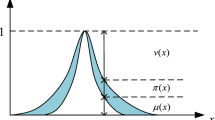Abstract
An approach to identify data-driven interpretable and accurate fuzzy models is presented in this paper. Firstly, Gustafson-Kessel fuzzy clustering algorithm is used to identify initial fuzzy model, and cluster validity indices are adopted to determine the number of rules. Secondly, orthogonal least square method and similarity measure of fuzzy sets are utilized to reduce the initial fuzzy model and improve its interpretability. Thirdly, constraint Levenberg-Marquardt algorithm is used to optimize the reduced fuzzy model to improve its accuracy. The proposed approach is applied to PH neutralization process, and results show its validity.
Preview
Unable to display preview. Download preview PDF.
Similar content being viewed by others
References
Takagi, T., Sugeno, M.: Fuzzy identification of systems and its application to modeling and control. IEEE Trans on Systems Man and Cybernetics 15(1), 116–132 (1985)
Sugeno, M., Yasukawa, T.: A fuzzy-logic- based approach to qualitative modeling. IEEE Trans on Fuzzy Systems 1(1), 7–31 (1993)
Wang, L.X.: Adaptive fuzzy systems and control: design and stability analysis. Prentice-Hall, Englewood Cliffs (1994)
Min, Y.C., Linkens, D.A.: Rule-base self-generation and simplification for data-driven fuzzy models. Fuzzy sets and systems 142(2), 243–265 (2004)
Gomez-Skarmeta, A.F., Delgado, M., Vila, M.A.: About the use of fuzzy clustering techniques for fuzzy model identification. Fuzzy Sets and Systems 106(2), 179–188 (1999)
Jang, J.R.: ANFIS: Adaptive-network-based fuzzy inference system. IEEE Trans on Systems Man, and Cybernetics 23, 665–684 (1993)
Lefteri, H.T., Robert, E.U.: Fuzzy and Neural Approaches in Engineering. Wiley, Chichester (1997)
Cordon, O., Herrera, F., Hoffmann, F., Magdalena, L.: Genetic Fuzzy Systems: Evolutionary Tuning and Learning of Fuzzy Rule Bases. World Scientific, Singapore (2001)
Cordon, O., Gomide, F., Herrera, F., Hoffmann, F., Magdalena, L.: Ten Years of Genetic Fuzzy Systems: Current Framework and New Trends. Fuzzy sets and systems 141(1), 5–31 (2004)
Babuska, R., Bersini, H., Linkens, D.A., Nauck, D., Tselentis, G., Wolkenhauer, O.: Future Prospects for Fuzzy Systems and Technology [EL/OB], Newsletter, Aachen, Germany. ERUDIT, vol. 6(1) (2000), Available: http://www.erudit.de/erudit/newsletters/news61/page5.html
Sentes, M., Babuska, R., Kaymak, U., Lemke, H.R.N.: Similarity Measures in Fuzzy Rule Base Simplification. IEEE Trans on Systems Man and Cybernetics 28(3), 376–386 (1998)
Yen, J., Wang, L.: Simplifying fuzzy modeling by both gray relational analysis and data transformation methods. IEEE Trans on Systems Man and Cybernetics 29(1), 13–24 (1999)
Abonyi, J., Roubos, J.A., Oosterom, M., Szeifert, F.: Compact TS-fuzzy models through clustering and OLS plus FIS model reduction. In: Proc of IEEE int conf on fuzzy systems, Sydney, Australia, pp. 1420–1423 (2001)
Delgado, M.R., Zuben, F.V., Gomide, F.: Multi-Objective Decision Making: Towards Improvement of Accuracy, Interpretability and Design Autonomy in Hierarchical Genetic Fuzzy Systems. In: Proc of IEEE int conf on fuzzy systems, Honolulu, Hawai, pp. 1222–1227 (2002)
Gustafson, D., Kessel, W.: Fuzzy clustering with a fuzzy covariance matrix. In: Proc of IEEE conf on decision and control, San Diego, USA, pp. 761–766 (1979)
Bezdek, J.C.: Pattern Recognition with fuzzy objective algorithm. Plenum Press, New York (1981)
Xie, X.L., Beni, G.: A Validity Measure for Fuzzy Clustering. IEEE Trans on Pattern Analysis and Machine Intelligence 13(8), 841–847 (1991)
Yen, J., Wang, L.: Simplifying fuzzy modeling by both gray relational analysis and data transformation methods. IEEE Trans on Systems Man and Cybernetics 29(1), 13–24 (1999)
Gaweda, A.E.: Optimal data-driven rule extraction using adaptive fuzzy neural models. University of Louisville (2002)
Babuska, R.: Fuzzy Modeling for Control. Kluwer Academic Publishers, Boston (1998)
Gath, I., Geva, A.B.: Fuzzy clustering for the estimation of the parameters of the components of mixtures of normal distributions. Pattern Recognition Letters 9, 77–86 (1989)
Author information
Authors and Affiliations
Editor information
Editors and Affiliations
Rights and permissions
Copyright information
© 2005 Springer-Verlag Berlin Heidelberg
About this paper
Cite this paper
Xing, Zy., Zhang, Y., Jia, Lm., Hu, Wl. (2005). Design of Interpretable and Accurate Fuzzy Models from Data. In: Wang, L., Jin, Y. (eds) Fuzzy Systems and Knowledge Discovery. FSKD 2005. Lecture Notes in Computer Science(), vol 3613. Springer, Berlin, Heidelberg. https://doi.org/10.1007/11539506_9
Download citation
DOI: https://doi.org/10.1007/11539506_9
Publisher Name: Springer, Berlin, Heidelberg
Print ISBN: 978-3-540-28312-6
Online ISBN: 978-3-540-31830-9
eBook Packages: Computer ScienceComputer Science (R0)




